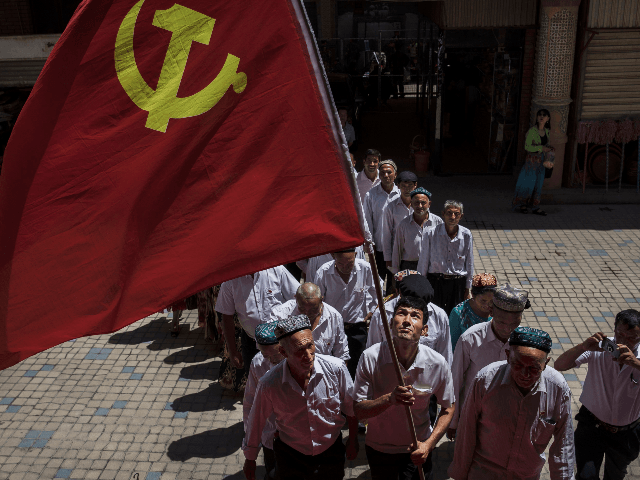Chinese state-run media on Tuesday continued the grotesque pretense that the concentration camps of Xinjiang province are merely “vocational training centers” by claiming that most of the “graduates” have exited the camps, found good jobs, and established happy lives.
China’s Global Times quoted Shorhat Zakir, deputy secretary of the Communist Party’s Xinjiang Committee, describing the camps as a triumphant effort to combat extremism that should be replicated elsewhere, ignoring human rights complaints from “overseas forces” that “attempt to collude with extremists and terrorists” in order to achieve their “political motives.” The Global Times continued:
Shohrat informed that trainees in these centers are learning about the law so they can know their basic rights, obligations, and responsibilities as a Chinese citizen. They are also taught the standard Chinese to better integrate into society along with lessons on practicing their religion in accordance with the law.
In response to questions on many Uyghurs being incarcerated in the training centers, Alken Tuniaz, a member of the Standing Committee of the CPC Xinjiang Committee and vice-chairman of the Xinjiang government, said that these reports are “not telling the truth and trying to call white as black and have other agendas.”
Respective spokespersons of the Chinese Foreign Ministry and the State Council Information Office have reiterated the information concerning these training centers. Setting these centers is an effective way of de-radicalization and curbing the menace of terrorism.
More than 90 percent of the trainees who graduated from these centers secured stable jobs and are living a happy life, he added. Many of the training centers in Xinjiang have also started offering short-term employment training to farmers.
Chinese Foreign Ministry spokeswoman Hua Chunying waved a letter of support from fifty other countries – including such noble paragons of human rights as Russia, Saudi Arabia, and Cuba – and declared efforts by the West to “tarnish” China’s reputation in Xinjiang are doomed to fail, as quoted by China’s Xinhua state news service:
“The 24 members, with a total population of no more than 600 million, are all developed Western countries, none of them being an Islamic or developing country. While of the 50 countries that support China are from Asia, Africa, Latin America and Europe, with a total population of nearly 2 billion, 28 are members of the Organization of the Islamic Cooperation, and their population is more than twice that of the 24 members that criticized China,” Hua said. “So it’s obvious who is right and who is wrong on the matter of Xinjiang,” she added.
Hua said many of the ambassadors who supported China’s Xinjiang policy have visited Xinjiang and witnessed the truth.
As the ambassadors pointed out, those who had visited Xinjiang found what they saw and heard was completely different from what was described in Western media reports, according to Hua.
“The ambassadors also appreciated China’s achievements in human rights, believed that Xinjiang’s establishment of vocational education and training centers, as well as other counter-terrorism and de-radicalization measures, effectively guaranteed basic human rights and urged relevant countries to stop their unfounded accusations against China,” said the spokesperson.
“In almost three years, not a single violent or terrorist incident took place in Xinjiang. The region now enjoys social stability and unity among all ethnic groups. People there are living a happy life with a stronger sense of fulfillment and security. They endorse the government’s policies and measures wholeheartedly,” said Hua, hitting all of the Communist Party’s talking points about vigorous vocational education leading Xinjiang’s Muslims away from terrorist extremism and into gainful employment.
“We resolutely oppose any country’s act of using the Human Rights Council and other mechanisms to interfere in other countries’ internal affairs and wantonly criticize, smear and pressure others,” she declared. “We urge the relevant countries to correct their mistakes at once, not to politicize the relevant issue or practice double standards, and stop meddling in other countries’ domestic affairs.”
A dark cloud drifted across China’s sunny assessment of the Xinjiang camps when Enwaer Tursun, one of the ethnic Uighur officials who strongly supported Beijing’s crackdown on “religious extremism,” was accused of corruption by the Xinjiang Commission for Discipline Inspection on Tuesday.
The South China Morning Post quoted another Communist official questioning Tursun’s devotion to re-educating Muslims, saying:
“[Tursun’s] downfall is the result of a crackdown of what the authorities called ‘two-faced men’,” a Xinjiang cadre said, using a party reference to officials who pay lip service to Beijing’s orders.
“Besides being corrupt, the leaders believed he was not firm in carrying out policies on ethnic minorities and religions when he was the mayor and head of the Kashgar’s united front work department,” the cadre said.
Tursun is the second Uygur cadre to fall from grace in recent weeks. Last week, Nur Bekri, the region’s former chairman who was later promoted to head the National Energy Administration in Beijing, stood trial in Shenyang, Liaoning province, accused of taking 79.1 million yuan (US$11.5 million) in bribes. State news agency Xinhua said the court would announce its verdict soon.
The Wall Street Journal on Tuesday cited human rights activists who question Beijing’s assertions that most of the people consigned to the Xinjiang camps have returned home and found work. The skeptics noted these claims were backed up by no documentation whatsoever or even firm numbers since China does not want to admit how many Xinjiang residents it incarcerated.
Uighur activists said they have received no credible information about mass releases from the concentration camps and are still unable to reach relatives who were forced into them.

COMMENTS
Please let us know if you're having issues with commenting.